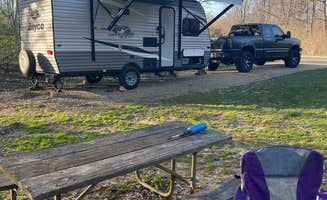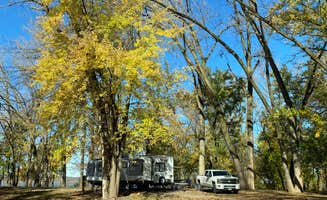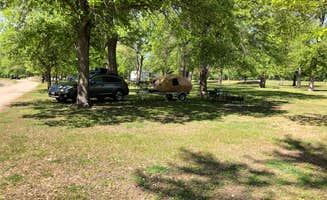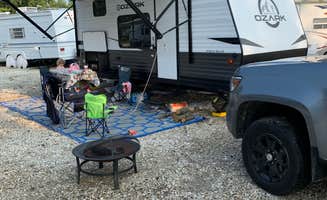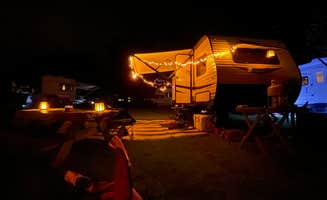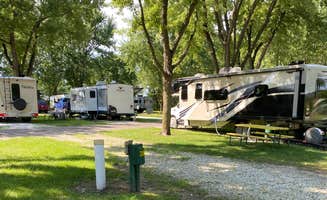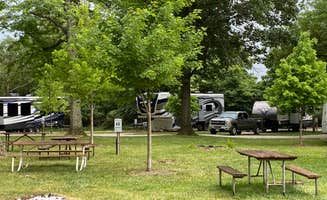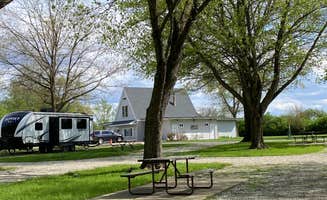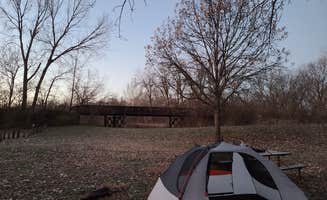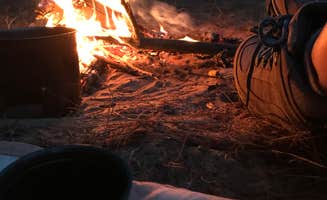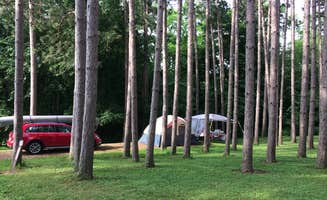Camping sites near Dunlap, Illinois range from primitive riverfront spots to full-hookup RV parks within a 30-mile radius. The region sits at approximately 600-700 feet above sea level in the Illinois River Valley, creating a mix of wooded highlands and river bottomlands. Fall camping season typically begins in mid-September with average temperatures around 70°F, making it a popular time for campers seeking moderate weather conditions after the humid summer months.
What to do
Hiking equestrian trails: At Jubilee College State Park Campground, visitors can access excellent horse trails that connect throughout the park. "Excellent horse trails. Went with a group of around 8 people and it was beautiful! Well maintained," notes Rachel H. The park's trail system supports multiple activities beyond horseback riding.
Night sky viewing: Parks in rural areas around Dunlap offer minimal light pollution. "Great campground to get out of the city. The viewing of stars is incredible," says Joe M. about Jubilee College State Park. Several campgrounds provide open areas ideal for stargazing, particularly during new moon phases.
Wildlife observation: Marshall State Fish and Wildlife Area features wetland habitats along the Illinois River. "We stood out by the boat ramps for a nice view across the river," writes Art S., who visited during bird hunting season. The area attracts numerous waterfowl species throughout the year, with peak migration periods in spring and fall.
Fishing opportunities: Multiple fishing access points exist throughout the region. Woodford State Fish and Wildlife Area provides designated fishing areas with boat access. "This rustic yet charming place was a welcoming respite for the weekend. The hosts are kind and friendly," notes Art S. The park includes a fish cleaning station for processing your catch.
What campers like
Waterfront campsites: Millpoint Park offers sites directly along the Illinois River with open water views. "Perched on Upper Peoria Lake where the Illinois River conjoins, this family-friendly and pet-inviting lush camping outpost is completely surrounded by Spring Bay Fen Nature Reserve," explains Stuart K. The sites feature full hookups with spacious layouts uncommon in many private campgrounds.
Privacy between sites: Many campers appreciate the ample space between campsites at certain parks. "This campground is our 'go-to' when we need a last minute getaway from city life. Located outside of Peoria, Jubilee is far enough away from town that you get clear, start night skies," shares Brooke C. The east loop at Jubilee College State Park offers better tree coverage and more privacy between sites.
Budget-friendly options: Carl Spindler Campground provides affordable waterfront camping close to Peoria. "Inexpensive tent sites with access for fishing, paddling, wildlife and sunset viewing," notes James M. The campground maintains rates around $24-28 per night for electric sites, significantly lower than many private RV parks in the region.
Winter camping availability: Unlike many seasonal campgrounds, some parks remain open year-round. "I have camped at this park several times over the last few years. Especially like winter truck camping here. The pit toilets are always available in the winter, and I usually have the park to myself," writes Jonathan J. about Jubilee College State Park.
What you should know
Water quality varies: Several campgrounds have mineral-rich water systems. At Millpoint Park, "The water here has a lot of iron in it, so don't attempt to drink it, but according to the locals, it's fine to shower in, so I would encourage you to bring a decent amount of bottled water with you," advises Stuart K. Similar issues exist at other campgrounds in the region.
Seasonal flooding risk: Low-lying campgrounds near the Illinois River experience periodic flooding. At Woodford State Fish and Wildlife Area, "While most of Illinois is low-lying, you will want to make particular note of this as you're encamped next to a river that can (and often does) flood," cautions Stuart K. Calling ahead to check conditions is recommended, especially after heavy rainfall.
Limited facilities at conservation areas: State conservation areas typically offer minimal amenities. "A little rough, but is kept up as best as they can. Funding for the area is lacking. It floods out when it storms. Alot of gnats. Entry road needs repairs," reports Jeny C. about Woodford State Conservation Area. However, these areas generally provide more solitude than developed campgrounds.
Hunting season impacts: Several camping areas around Dunlap are within active hunting zones. "At 5 AM diesel pickup trucks pulling boats began to pull into the parking area. It was cold and dark so we stayed inside. Eventually we heard the boats heading out along with gun shots," describes Art S. about Marshall State Fish and Wildlife Area. Fall campers should be aware of hunting schedules and wear bright colors when hiking.
Tips for camping with families
Playground availability: Limited playground options exist at most conservation areas. Carl Spindler Campground has "Small and outdated playground and a basketball stand but no basket or net," according to Lee D. Families seeking recreational facilities should consider bringing their own activities.
Fishing spots for kids: Several parks offer beginner-friendly fishing access. At Millpoint Park, one visitor shared, "Took my son out fishing and had him practice casting! He is 4. If you're looking to escape, be in nature, close to the water with nice sites, this place is it," writes Ranko K. The park has small lakes where children can easily fish from the shore.
Site selection for tent campers with children: Starved Rock Campground requires careful site selection. "The east loop has better tree coverage and more privacy. The west loop has more site in a large open space, maybe better for groups," advises Kim L. Avoid sites near water spigots and roads as other campers frequently cut through these areas.
Wildlife encounters: Some campgrounds have significant wildlife activity. At Jubilee College State Park, Ashley C. reports, "This camping spot was very quiet and secluded, just like I wanted, but at about midnight there were at least 3 bobcats snarling and growling near our tents and then they circled our tents, sniffing them." Preparing children for possible wildlife encounters is recommended.
Tips from RVers
Level sites: Many RV sites around Dunlap require minimal leveling. At Millpoint Park, Melissa C. notes they "enjoyed a nice pull-through full hookup site that required minimal leveling." However, site conditions vary significantly between parks, with state facilities typically less developed than private campgrounds.
Long-term stays: Some campgrounds accommodate longer stays. Carl Spindler Campground "appeared that there were many long-term campers staying here," observed Lee D. The park's location near Peoria makes it popular with working travelers and seasonal residents.
Gate access restrictions: Sankoty Lakes requires special access procedures. "The RV area is only accessible by driving around the side of the complex and through a neighborhood, and then you have to wait for someone to come open the gate," explains Elizabeth R. RVers should confirm access procedures when making reservations.
Dump station timing: Plan for potential wait times at busy campgrounds. At Starved Rock Campground, "Took about 45 min for us to dump being 5th in line at 10:30am," reports Kim L. Most campgrounds have single dump stations that can become congested during peak checkout times, typically between 10am-noon on Sundays.


